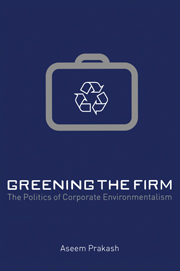Book contents
5 - Beyond-compliance: findings and conclusions
Published online by Cambridge University Press: 22 September 2009
Summary
This book examined environmental policymaking within two firms – Baxter International Inc. and Eli Lilly and Company – by exploring the internal processes that led them to selectively adopt Type 2 policies. Ten cases were examined: four common to these firms (underground tanks, 33/50, ISO 14000, and environmental audits), and one each specific to them (Responsible Care to Lilly and Green Products to Baxter). All cases pertain to policymaking during 1975 to mid 1996. Cases were selected to ensure variation on independent variables (factors external and internal to firms). Further, as advised by King, Keohane, and Verba (1994), given the small sample size, I also ensured variation on the dependent variable (policy adoption or non-adoption). This discussion is summarized in table 5.1.
Firms' environmental policies were classified on two attributes: (1) whether they meet or exceed the requirements of laws and regulations, and (2) whether or not they meet or exceed the criteria specified in investment appraisal procedures. Based on this classification, four modal types of environmental policies were identified: Type 1 (those which go beyond-compliance and also meet or exceed the profit criteria), Type 2 (those which go beyond-compliance but cannot or do not meet the profit criteria), Type 3 (those which are required by law and also meet or exceed the profit criteria) and Type 4 (those which are required by law but cannot or do not meet the profit criteria).
- Type
- Chapter
- Information
- Greening the FirmThe Politics of Corporate Environmentalism, pp. 134 - 161Publisher: Cambridge University PressPrint publication year: 2000



